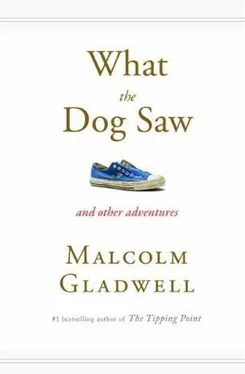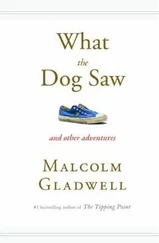Malcolm Gladwell - What the Dog Saw - And Other Adventures
Здесь есть возможность читать онлайн «Malcolm Gladwell - What the Dog Saw - And Other Adventures» весь текст электронной книги совершенно бесплатно (целиком полную версию без сокращений). В некоторых случаях можно слушать аудио, скачать через торрент в формате fb2 и присутствует краткое содержание. Жанр: Психология, на английском языке. Описание произведения, (предисловие) а так же отзывы посетителей доступны на портале библиотеки ЛибКат.
- Название:What the Dog Saw: And Other Adventures
- Автор:
- Жанр:
- Год:неизвестен
- ISBN:нет данных
- Рейтинг книги:5 / 5. Голосов: 1
-
Избранное:Добавить в избранное
- Отзывы:
-
Ваша оценка:
- 100
- 1
- 2
- 3
- 4
- 5
What the Dog Saw: And Other Adventures: краткое содержание, описание и аннотация
Предлагаем к чтению аннотацию, описание, краткое содержание или предисловие (зависит от того, что написал сам автор книги «What the Dog Saw: And Other Adventures»). Если вы не нашли необходимую информацию о книге — напишите в комментариях, мы постараемся отыскать её.
What the Dog Saw: And Other Adventures — читать онлайн бесплатно полную книгу (весь текст) целиком
Ниже представлен текст книги, разбитый по страницам. Система сохранения места последней прочитанной страницы, позволяет с удобством читать онлайн бесплатно книгу «What the Dog Saw: And Other Adventures», без необходимости каждый раз заново искать на чём Вы остановились. Поставьте закладку, и сможете в любой момент перейти на страницу, на которой закончили чтение.
Интервал:
Закладка:
The last of the Morrises to be active in the pitching business is Arnold (the Knife) Morris, so named because of his extraordinary skill with the Sharpcut, the forerunner of the Ginsu. He is in his early seventies, a cheerful, impish man with a round face and a few wisps of white hair, and a trademark move whereby, after cutting a tomato into neat, regular slices, he deftly lines the pieces up in an even row against the flat edge of the blade. Today, he lives in Ocean Township, a few miles from Asbury Park, with Phyllis, his wife of twenty-nine years, whom he refers to (with the same irresistible conviction that he might use to describe, say, the Feather Touch Knife) as “the prettiest girl in Asbury Park.” One morning recently, he sat in his study and launched into a pitch for the Dial-O-Matic, a slicer produced by S. J. Popeil some forty years ago.
“Come on over, folks. I’m going to show you the most amazing slicing machine you have ever seen in your life,” he began. Phyllis, sitting nearby, beamed with pride. He picked up a package of barbecue spices, which Ron Popeil sells alongside his Showtime Rotisserie, and used it as a prop. “Take a look at this!” He held it in the air as if he were holding up a Tiffany vase. He talked about the machine’s prowess at cutting potatoes, then onions, then tomatoes. His voice, a marvelous instrument inflected with the rhythms of the Jersey Shore, took on a singsong quality: “How many cut tomatoes like this? You stab it. You jab it. The juices run down your elbow. With the Dial-O-Matic, you do it a little differently. You put it in the machine and you wiggle” – he mimed fixing the tomato to the bed of the machine. “The tomato! Lady! The tomato! The more you wiggle, the more you get. The tomato! Lady! Every slice comes out perfectly, not a seed out of place. But the thing I love my Dial-O-Matic for is coleslaw. My mother-in-law used to take her cabbage and do this.” He made a series of wild stabs at an imaginary cabbage. “I thought she was going to commit suicide. Oh, boy, did I pray – that she wouldn’t slip! Don’t get me wrong. I love my mother-in-law. It’s her daughter I can’t figure out. You take the cabbage. Cut it in half. Coleslaw, hot slaw. Pot slaw. Liberty slaw. It comes out like shredded wheat…”
It was a vaudeville monologue, except that Arnold wasn’t merely entertaining; he was selling. “You can take a pitchman and make a great actor out of him, but you cannot take an actor and always make a great pitchman out of him,” he says. The pitchman must make you applaud and take out your money. He must be able to execute what in pitchman’s parlance is called “the turn” – the perilous, crucial moment where he goes from entertainer to businessman. If, out of a crowd of fifty, twenty-five people come forward to buy, the true pitchman sells to only twenty of them. To the remaining five, he says, “Wait! There’s something else I want to show you!” Then he starts his pitch again, with slight variations, and the remaining four or five become the inner core of the next crowd, hemmed in by the people around them, and so eager to pay their money and be on their way that they start the selling frenzy all over again. The turn requires the management of expectation. That’s why Arnold always kept a pineapple tantalizingly perched on his stand. “For forty years, I’ve been promising to show people how to cut the pineapple, and I’ve never cut it once,” he says. “It got to the point where a pitchman friend of mine went out and bought himself a plastic pineapple. Why would you cut the pineapple? It cost a couple bucks. And if you cut it they’d leave.” Arnold says that he once hired some guys to pitch a vegetable slicer for him at a fair in Danbury, Connecticut, and became so annoyed at their lackadaisical attitude that he took over the demonstration himself. They were, he says, waiting for him to fail: he had never worked that particular slicer before and, sure enough, he was massacring the vegetables. Still, in a single pitch he took in $200. “Their eyes popped out of their heads,” Arnold recalls. “They said, ‘We don’t understand it. You don’t even know how to work the damn machine.’ I said, ‘But I know how to do one thing better than you.’ They said, ‘What’s that?’ I said, ‘I know how to ask for the money.’ And that’s the secret to the whole damn business.”
4.
Ron Popeil started pitching his father’s kitchen gadgets at the Maxwell Street flea market in Chicago, in the midfifties. He was thirteen. Every morning, he would arrive at the market at five and prepare fifty pounds each of onions, cabbages, and carrots, and a hundred pounds of potatoes. He sold from six in the morning until four in the afternoon, bringing in as much as $500 a day. In his late teens, he started doing the state- and county-fair circuit, and then he scored a prime spot in the Woolworth’s at State and Washington, in the Loop, which at the time was the top-grossing Woolworth’s store in the country. He was making more than the manager of the store, selling the Chop-O-Matic and the Dial-O-Matic. He dined at the Pump Room and wore a Rolex and rented $150-a-night hotel suites. In pictures from the period, he is beautiful, with thick dark hair and blue-green eyes and sensuous lips, and, several years later, when he moved his office to 919 Michigan Avenue, he was called the Paul Newman of the Playboy Building. Mel Korey, a friend of Ron’s from college and his first business partner, remembers the time he went to see Ron pitch the Chop-O-Matic at the State Street Woolworth’s. “He was mesmerizing,” Korey says. “There were secretaries who would take their lunch break at Woolworth’s to watch him because he was so good-looking. He would go into the turn, and people would just come running.” Several years ago, Ron’s friend Steve Wynn, the founder of the Mirage resorts, went to visit Michael Milken in prison. They were near a television, and happened to catch one of Ron’s infomercials just as he was doing the countdown, a routine taken straight from the boardwalk, where he says, “You’re not going to spend two hundred dollars, not a hundred and eighty dollars, not one-seventy, not one-sixty…” It’s a standard pitchman’s gimmick: it sounds dramatic only because the starting price is set way up high. But something about the way Ron did it was irresistible. As he got lower and lower, Wynn and Milken – who probably know as much about profit margins as anyone in America – cried out in unison, “Stop, Ron! Stop!”
Was Ron the best? The only attempt to settle the question definitively was made some forty years ago when Ron and Arnold were working a knife set at the Eastern States Exposition, in West Springfield, Massachusetts. A third man, Frosty Wishon, who was a legend in his own right, was there, too. “Frosty was a well-dressed, articulate individual and a good salesman,” Ron says. “But he thought he was the best. So I said, ‘Well, guys, we’ve got a ten-day show, eleven, maybe twelve hours a day. We’ll each do a rotation, and we’ll compare how much we sell.” In Morris-Popeil lore, this is known as “the shoot-out,” and no one has ever forgotten the outcome. Ron beat Arnold, but only by a whisker – no more than a few hundred dollars. Frosty Wishon, meanwhile, sold only half as much as either of his rivals. “You have no idea the pressure Frosty was under,” Ron continues. “He came up to me at the end of the show and said, ‘Ron, I will never work with you again as long as I live.’ ”
No doubt Frosty Wishon was a charming and persuasive person, but he assumed that this was enough – that the rules of pitching were the same as the rules of celebrity endorsement. When Michael Jordan pitches McDonald’s hamburgers, Michael Jordan is the star. But when Ron Popeil or Arnold Morris pitched, say, the Chop-O-Matic, his gift was to make the Chop-O-Matic the star. It was, after all, an innovation. It represented a different way of dicing onions and chopping liver: it required consumers to rethink the way they went about their business in the kitchen. Like most great innovations, it was disruptive. And how do you persuade people to disrupt their lives? Not merely by ingratiation or sincerity, and not by being famous or beautiful. You have to explain the invention to customers – not once or twice but three or four times, with a different twist each time. You have to show them exactly how it works and why it works, and make them follow your hands as you chop liver with it, and then tell them precisely how it fits into their routine, and, finally, sell them on the paradoxical fact that, revolutionary as the gadget is, it’s not at all hard to use.
Читать дальшеИнтервал:
Закладка:
Похожие книги на «What the Dog Saw: And Other Adventures»
Представляем Вашему вниманию похожие книги на «What the Dog Saw: And Other Adventures» списком для выбора. Мы отобрали схожую по названию и смыслу литературу в надежде предоставить читателям больше вариантов отыскать новые, интересные, ещё непрочитанные произведения.
Обсуждение, отзывы о книге «What the Dog Saw: And Other Adventures» и просто собственные мнения читателей. Оставьте ваши комментарии, напишите, что Вы думаете о произведении, его смысле или главных героях. Укажите что конкретно понравилось, а что нет, и почему Вы так считаете.












